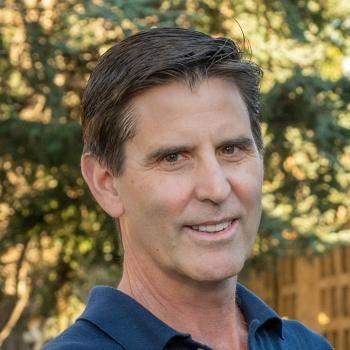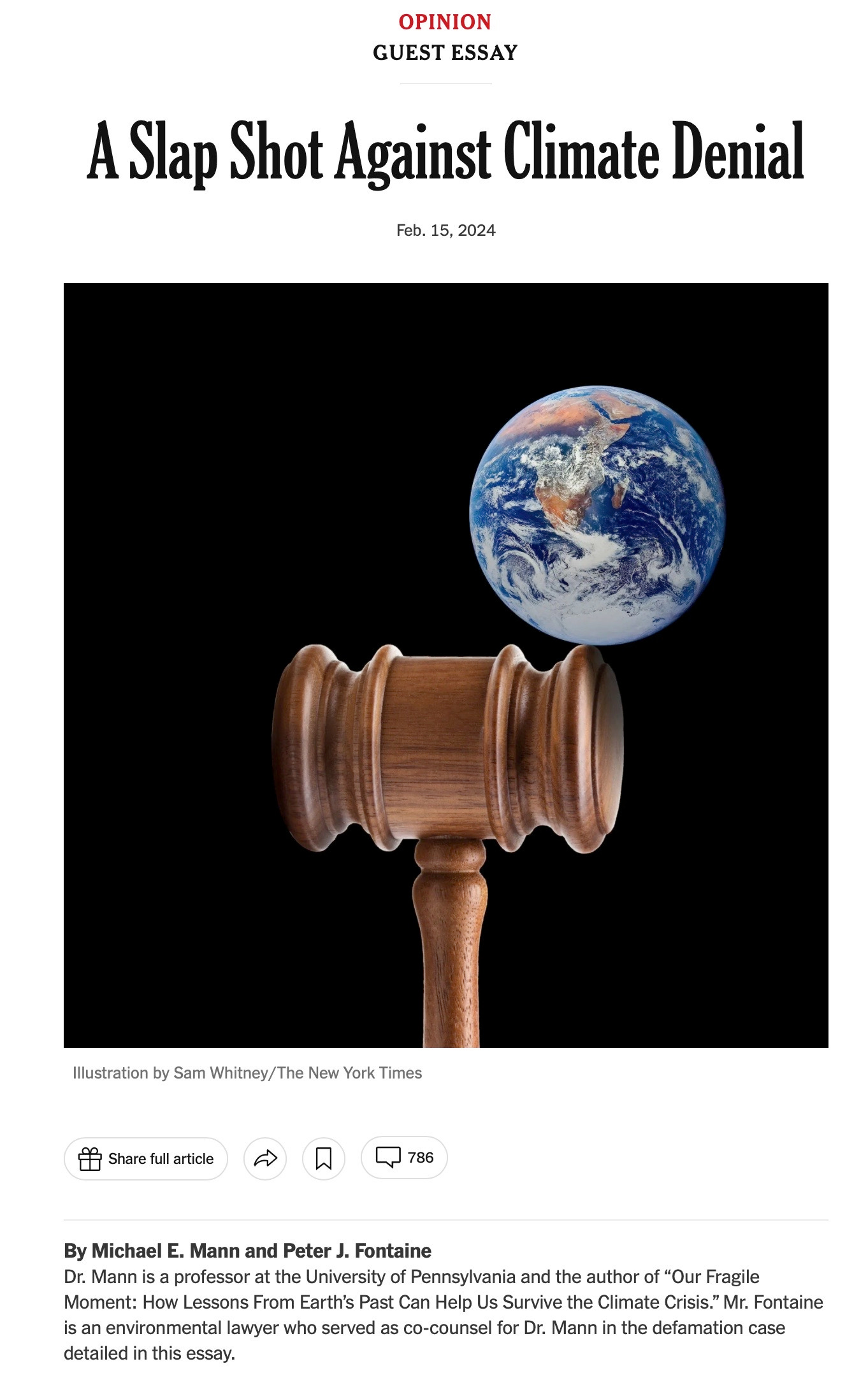SLAPPed!
Penn's Michael Mann and his lawyers get sanctioned for “extraordinary” misconduct in climate defamation case. Mann and Stanford’s Mark Jacobson are now 0-2 in using lawfare against their critics.


My, oh my, how the worm has turned.
Thirteen months ago, in the op-ed pages of the New York Times, University of Pennsylvania climate scientist Michael Mann and his lawyer, Peter J. Fontaine, were crowing about their victory in federal court a few days earlier. They were thrilled that a jury in Washington, DC, had decided that the defendants in the case, Rand Simberg and Mark Steyn, had defamed Mann. The jury awarded the combative academic $1 in compensatory damages from Simberg and Steyn. It also awarded Mann punitive damages of $1,000 from Simberg and $1 million from Steyn.
Mann claimed the jury’s decision was “a victory for science and it’s a victory for scientists.”
In their February 15, 2024, op-ed, Mann and Fontaine said, “We hope this sends a broader message that defamatory attacks on scientists go beyond the bounds of protected speech and have consequences...However, we lament the time lost to this battle. This case is part of a larger culture war in which research is distorted and the truth about the climate threat is dissembled.”
Yes, well.
It turns out that Mann — who is the “presidential distinguished professor of earth and environmental science and director of the Penn Center for Science Sustainability, and the Media” as well as Penn’s “inaugural vice provost for climate science, policy, and action” — and Fontaine, were the dissemblers.
As reported here on Substack by Roger Pielke Jr., a federal court in Washington, DC, ruled yesterday that Mann and his lawyers acted in “bad faith” and “made false representations to the jury and the Court regarding damages stemming from loss of grant funding.” As Pielke explains:
This ruling follows closely on the heels of the same court reducing the punitive damages awarded to Mann against one of the defendants from $1,000,000 to $5,000. That reduction follows the Court’s order that Mann pay $530,820.21 of legal expenses that his lawsuit resulted in for The National Review — which Mann had also sued, but whose case was dismissed.
In his ruling, the judge on the case, Alfred S. Irving, Jr., said that Mann and his lawyers:
Each knowingly made a false statement of fact to the Court and Dr. Mann knowingly participated in the falsehood, endeavoring to make the strongest case possible even if it required using erroneous and misleading information. (Emphasis added.)
The 46-page decision is a blistering takedown of Mann and his legal team. Judge Irving, who was appointed to the bench by President George W. Bush in 2008, writes that:
Dr. Mann makes several arguments against the imposition of sanctions, all of which are unavailing. First, Dr. Mann’s assertion that there was no falsehood or misrepresentation in his testimony or his counsel’s conduct borders on frivolity. (Emphasis added.)
Irving ruled that Mann’s lawyers’ “bad faith misconduct is an affront to the Court’s authority and an attack on the integrity of the proceedings warranting sanctions.”
Mann and his lawyers are now facing fines from the court that, as Pielke explains, will likely be in the tens of thousands of dollars. As noted above, Mann must also pay National Review’s legal fees. According to a source close to the case, Mann has appealed that ruling and asked the court to waive a requirement that he post a bond in order to obtain a stay pending the appeal.
I emailed Mann twice for comment. He did not reply.
On Wednesday afternoon, I talked to Pielke about Mann’s case. He pointed to two stunning outcomes. First, he said, Mann’s case “was all about misrepresenting evidence and data, and yet, Mann’s the one who has been sanctioned about manipulating evidence.” Second, he said that Steyn and Simburg will likely ask the court for a ruling that will force Mann to pay their legal fees as well. Thus, Mann went “from getting a million dollar judgment from Steyn to possibly owing a million dollars in legal fees, or more.”
The maliciousness of Mann’s actions in his defamation case is matched — or perhaps even surpassed — by the lawfare that Stanford academic Mark Jacobson has used against his critics.
In 2017, as I reported in National Review, Jacobson filed a $10 million defamation lawsuit against the National Academy of Sciences and Chris Clack, the lead author of a paper the NAS published that year that had thoroughly debunked one of Jacobson’s papers. Jacobson, a thin-skinned engineering professor, had written a paper claiming the US could run entirely on alt-energy by 2050. I explained that Clack’s paper found that:
Jacobson had overstated hydropower’s potential by a factor of ten or so. The land-use requirements for wind power were equally cartoonish. Clack determined that Jacobson’s all-renewable scheme would require covering more than 190,000 square miles with turbines — an area larger than the state of California. Given the burgeoning coast-to-coast backlash against Big Wind, such a notion is absurd on its face.
Jacobson’s lawsuit claimed that the paper had damaged his reputation and made him and his co-authors look bad. Rather than debate the issues, Jacobson sued.
Context here is essential. Jacobson’s work was a favorite among climate activists and Hollywood elites, including Leonardo di Caprio. In 2016, 350.org founder and veteran climate activist Bill McKibben wrote a cover story in the New Republic in which he lauded the Stanford professor’s work, saying it “demonstrates conclusively” that the US could “generate 80 to 85% of its power from sun, wind, and water by 2030, and 100% by 2050.”
Except it didn’t. And it won’t.
In February 2018, Jacobson, in an apparent act of remorse, suddenly withdrew his lawsuit against NAS and Clack. But the case wasn’t forgotten. As I explained in Forbes in 2020, a federal court judge in Washington, DC, sided with NAS and Clack and ordered Jacobson to pay their legal fees. I explained the judge in the case concluded:
The District of Columbia’s Anti-SLAPP Act prohibits the filing of lawsuits aimed at limiting public participation. She wrote that the statements made by Clack and his co-authors in their 2017 paper “simply do not” accuse Jacobson “of any misconduct or impugn his integrity. The Court has reviewed the Complaint, the motion and the related pleadings as well as the attachments thereto, and finds that the three asserted ‘egregious errors’ are statements reflecting scientific disagreements...they simply do not attack Dr. Jacobson’s honesty or accuse him of misconduct.” It goes on, saying that challenges to whether or not Jacobson’s methodology and conclusions are good or bad is “a question best resolved in the scientific or academic forum, not the court.” In her conclusion, Wingo wrote that the “Anti-SLAPP Act was enacted to protect the right of advocacy on issues of public interest against lawsuits intended to punish or censor speech. The safeguards provided by the Act including reasonable attorney’s fees and costs are critical parts of the statute that must serve its purpose and be upheld. Defendants are entitled to recoup such fees...” (Emphasis added.)
What has happened since then?
Jacobson has spent years bobbing and weaving his way through the courts in an ongoing attempt to avoid paying those fees. The NAS’s lawyers claimed legal fees of $535,903.65. Clack’s legal team asked for $75,000. As I noted in Quillette in 2022, Clack told me Jacobson paid the $75,000.
Jacobson has dragged Stanford into his tawdry litigation. In 2022, according to a document posted on RetractionWatch.com, Jacobson said that the California Labor Commission had ordered Stanford to reimburse him for:
$62,101.99 in legal costs and $7,452.24 in interest (thus, a total of $69,554.23) for the 3 years of legal expenses I incurred prior to that date under California Labor Code 2802 for ‘necessary expenditures or losses incurred by the employee in direct consequence of the discharge of his or her duties.’ The Commissioner also ruled that it would decide on the $75,000 payment to Clack if I did not win the D.C. Appeal. This would presumably apply to the $428,000 to NAS as well.
Also, in 2022, Jacobson sued Stanford. That case was apparently settled in 2023. In February 2024, according to Retraction Watch, Jacobson lost in his appeal to avoid paying the NAS’s fees.
How much did Stanford pay in Jacobson’s SLAPP litigation? Brad Hayward, an associate vice president for communications at Stanford, did not reply to two emails or a phone call requesting answers to questions about the litigation and the university’s payment of Jacobson’s legal bills.
Jacobson refused to answer a list of emailed questions, only replying, "The matter was resolved."
There are several punchlines here. First and most obvious: Mann and Jacobson’s behavior is beyond shameful.
The fact that they are working at two of the world’s most prestigious universities only makes their actions more repulsive. Rather than engage in open dialogue, as is the custom in academia, they took their critics to court. They forced them to spend, in the aggregate, millions of dollars on lawyers that should have never been spent.
The Hall of Shame in these two defamation cases includes Stanford and Penn. Why haven’t those schools disavowed the odious legal tactics of their academics? Why won’t Stanford come clean about the Jacobson case? Why won’t it reveal the truth about the legal bills it was forced to pay in a SLAPP suit that should have never been filed? Has Penn sanctioned or disciplined Mann for his actions? Will Penn, like Stanford, be helping pay Mann’s legal bills?
The Hall of Shame includes Science, which defended Mann, saying after the jury verdict that there are “limits to which scientists working on politically sensitive topics can be falsely attacked.” But the judge determined Mann made a false statement in court. Will Science now reprimand Mann for his actions?
The Hall of Shame includes the New York Times. A federal court judge has ruled that Mann and Fontaine “knowingly made a false statement of fact to the Court and Dr. Mann knowingly participated in the falsehood.” Given that finding, will the Times retract the splashy op-ed Mann and Fontaine published in its pages just 13 months ago? Will it cover the latest court ruling sanctioning Mann with the same gusto it covered the jury award last year?
Call me a cynic, but I’m not holding my breath.
I’ll give the final words to Pielke, who has been active in the climate debate and academia for decades. He said the big institutions “who are supposed to be the defenders of science are on the wrong side in both of these cases. And rather than admit it, they are doubling down by keeping quiet and trying to ignore all of this.”
It is, he said, a “thunderous silence.”
Before you go:
Please click that ♡ button, subscribe, and share.







Those who advocate "Culling for Climate" (another Pielke article) have been lying about solar and wind for 50 years. I doubt they will stop but perhaps they will be unable to use the courts to cancel their opponent.
Mann respond to a question? Hell we couldn’t even get him to respond to a simple scientific question in the form of a Tweet!
Great post, Robert!